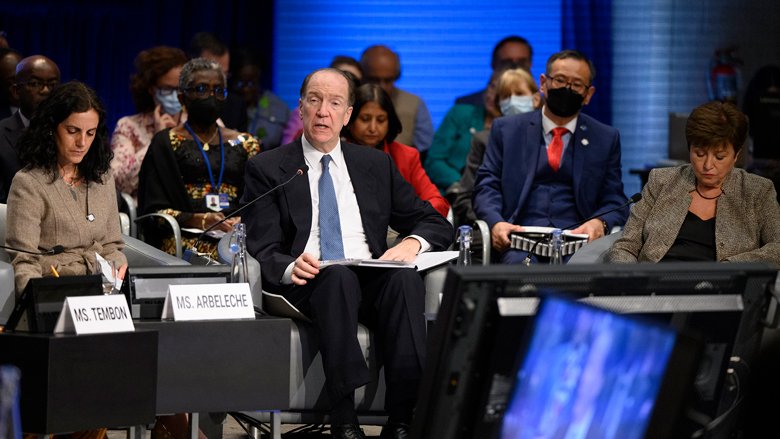The Russian invasion of Ukraine weighed heavily on the minds of policymakers attending the meetings. At the Second Ministerial Roundtable Discussion for Support for Ukraine, leaders expressed unified support for the country. The World Bank, the European Union, and the Ukrainian government last month published a Rapid Damage and Needs Assessment that estimated Ukraine’s recovery and reconstruction needs at $349 billion—one-and-a-half times Ukraine’s pre-invasion GDP.
"The more assistance Ukraine gets now, the sooner we'll come to an end to the Russian war," Ukrainian President Volodymyr Zelensky told the session via video.
The war is one among a set of overlapping crises currently affecting the world. This year’s public events allowed policy makers, experts, private sector players, and other stakeholders to share ideas on some of the key challenges—inclusive growth, food security, education, and the low-carbon, resilient transition. The conversations took on added urgency amid heightened global recession risk, the biggest increase in global poverty in decades, and a fifth wave of debt that could lead to crises in developing countries.
The event on inclusive growth underscored the need for policy makers to prepare now for tougher financial conditions and the importance of policy reform, innovation, and investing in people to achieving shared prosperity.
“We need to hold ourselves to a standard, not of asking whether we're doing good things and more good things than we used to, but whether we're doing enough good things relative to the immense global challenge, and the immense global opportunity,” Lawrence Summers, former U.S. Treasury Secretary and President Emeritus of Harvard University, said at the event. Summers is also a former World Bank Chief Economist.
Another high-level event, the cost of the food and fuel crises, looked at how countries can tackle food and energy shocks, which have been exacerbated by the Russian invasion of Ukraine and are having the largest impact on the poor. A key takeaway from the session: policy makers should avoid export restrictions, protect vulnerable communities, and retain a focus on the transition to clean energy and resilient food systems.
Malpass told Tuesday’s meeting of the G20 Finance and Agriculture ministers that food prices are likely to stay at historically high levels through 2024 as the war in Ukraine continues to alter the patterns of trade, production, and consumption. The World Bank has already committed $6.3 billion from its $30 billion food security response package, which is designed to help farmers boost production, improve nutrition, and build resilient food systems.
Climate change is another emergency that was in the spotlight during the meetings. An event Thursday on financing the low-carbon, resilient transition examined ways to address climate and development needs simultaneously while supporting people and communities.
The focus on climate was consistent throughout the week. Leaders discussed a new Scaling Climate Action by Lowering Emissions, or SCALE, fund, which will provide grant payments to developing countries for achieving verified emissions reductions. The fund will be launched next month at COP 27. Malpass told the Coalition of Finance Ministers for Climate Action that the World Bank is also working on coal decommissioning projects, methane emission reduction initiatives, and a slew of new Country Climate and Development Reports (CCDRs). On Wednesday, for example, a CCDR for China estimated that the country needs $14-17 trillion in additional investments for green infrastructure and technology in the power and transport sectors alone to reach net-zero emissions by 2060.
While recession fears and increasing fragility have been dominating the headlines, one of COVID-19’s long-lasting impacts has been the effect on education. At a time when 70 percent of children in developing countries are unable to understand a simple written text and older youths are finding an inhospitable job market, the challenges posed by learning losses were the subject of another event. Speakers at the session on investing in education agreed on the importance of prioritizing investments to accelerate learning and skills recovery.
In his speech at Stanford, Malpass surveyed the global economic landscape and warned that a sea change in fiscal, monetary, and regulatory policies since the 2008 financial crisis creates the risk of decades of underinvestment in development.
“The urgency is clear in daily news reports of inflation, climate change, famine, civil protests, and violence,” Malpass said. “The World Bank Group is fully engaged in these challenges, realistic in our assessments, and eager to work on solutions.”

